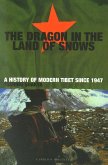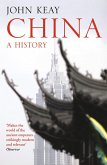The history of Tibet has long intrigued the world, and so has the dilemma of its future-will it ever return to independence or will it always remain part of China? How will the succession of the aging and revered Dalai Lama affect Tibet and the world? This book makes the case for a fully Tibetan independent state for much of its 2,500-year existence, but its story is a complex one. A great empire from the seventh to ninth centuries, in 1249, Tibet was incorporated as a territory of the Mongol Empire-which annexed China itself in 1279. Tibet reclaimed its independence from China in 1368, and although the Manchus later exerted their direct influence in Tibetan affairs, by 1840 Tibet began to resume its independent course until communist China invaded in 1950. And since that time, Tibetan nationalism has been maintained primarily by over 100,000 refugees living abroad. This book is a valuable, fascinating account of a region with a rich history, but an uncertain future.
Dieser Download kann aus rechtlichen Gründen nur mit Rechnungsadresse in A, B, BG, CY, CZ, D, DK, EW, E, FIN, F, GR, HR, H, IRL, I, LT, L, LR, M, NL, PL, P, R, S, SLO, SK ausgeliefert werden.









